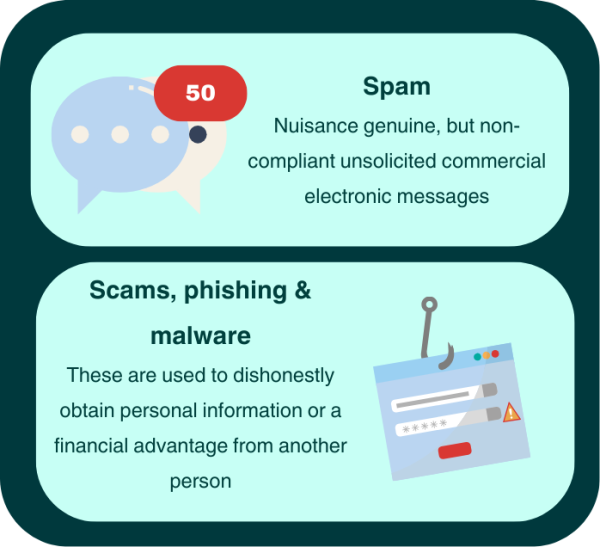What is unsolicited messaging?
Spam refers to nuisance messaging; this includes genuine, but non-compliant unsolicited commercial electronic messages such as any unwanted email, fax, SMS text message, or other instant message that is commercial by nature.
Spam includes scam messages; SMS, email or other digital messages that contain phishing links, malware or other means of dishonestly gaining a financial advantage.
Different types of spam
There are different types of spam:

Nuisance spam refers to unsolicited commercial messages sent from a legitimate source (like a business). You should only receive a commercial message when:
- you have given consent, such as ticking a box on a website or filling in a form to receive messages
- the organisation sending the message is clearly identified
- there are clear instructions on how to unsubscribe from the messages if you wish.
On the other hand, scams, phishing and malware are examples of harmful messaging. They are created with the intention to harm the recipients.
Protect yourself against scams
The Department of Internal Affairs has created a helpful checklist of steps you can take to reduce your risk of being scammed. To download the checklist visit their website(external link) .
What to do if you have been scammed
Remember scammers send thousands of messages a day so if you have been scammed do not feel embarrassed.
- Stop all contact with the scammer - Once you realise you are being scammed, do not continue the conversation. Hang up the phone. Don’t reply to emails or letters scammers have sent you. If you have been scammed online, block the scammer from contacting you.
- Do not make any more payments – Some scammers target people caught in recent scams, e.g by pretending to be an enforcement agency that can return all of your money for a fee. Don’t give money to anyone on the promise they will get your lost money back.
- Report the scam – If you have lost If you have lost money in a scam or are getting threats you should contact NZ Police at police.govt.nz(external link)(external link).
- Contact the bank or service you sent money through - If you are the victim of a financial scam, credit card scam or identity theft, contact your bank immediately. They will have a policy in place to deal with fraud. If you have sent money through another bank or transfer service, it’s a good idea to contact the service you used.
The Department of Internal Affairs has created a helpful factsheet that gives more information about what to do if you receive spam. To download the checklist visit their website(external link)(external link).
What to do if you have been scammed
Remember scammers send thousands of messages a day so if you have been scammed do not feel embarrassed.
- Stop all contact with the scammer - Once you realise you are being scammed, do not continue the conversation. Hang up the phone. Don’t reply to emails or letters scammers have sent you. If you have been scammed online, block the scammer from contacting you.
- Do not make any more payments – Some scammers target people caught in recent scams, e.g by pretending to be an enforcement agency that can return all of your money for a fee. Don’t give money to anyone on the promise they will get your lost money back.
- Report the scam – If you have lost If you have lost money in a scam or are getting threats you should contact NZ Police at police.govt.nz(external link)(external link).
- Contact the bank or service you sent money through - If you are the victim of a financial scam, credit card scam or identity theft, contact your bank immediately. They will have a policy in place to deal with fraud. If you have sent money through another bank or transfer service, it’s a good idea to contact the service you used.
The Department of Internal Affairs has created a helpful factsheet that gives more information about what to do if you receive spam. To download the checklist visit their website(external link)(external link).
How to report spam and scams
Text spam
- Report the text spam for free by forwarding the spam message to the Te Tari Taiwhenua Department of Internal Affairs at 7726.
- You can also watch the videos below that provide a step-by-step guide on how to report spam or scam messages to 7726:
How to report a scam text message to 7726 – Apple device
How to report a scam text message to 7726 – Android device
Email spam
- Report email spam by filling in the online form on the Te Tari Taiwhenua Department of Internal Affairs website(external link)(external link).
Financial scam
- If you have lost money in a scam or are getting threats from an online scam you should contact NZ Police at police.govt.nz(external link)(external link).
Malware attack
- CERT NZ support individuals and schools who are affected by cyber security incidents such as malware attacks, business email compromise and scam websites. You can report issues to them at cert.govt.nz/report(external link) or call 0800 2378 69.